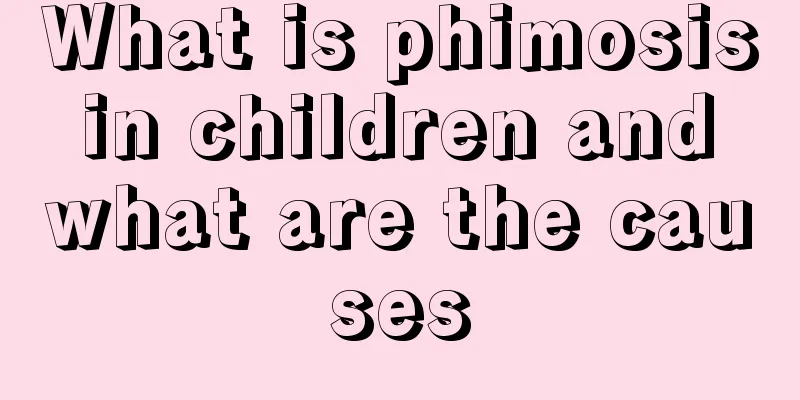Why does a child pee at night?

|
Everyone knows that babies don’t have much thoughts and even urinate at will. But normally, children rarely wet the bed when they are 1 to 2 years old. Children will still wet the bed at night after they are two or three years old, but basically not during the day. If a child is four or five years old and still wets the bed at night, it is abnormal. Clinically, it is called nocturnal enuresis. So how should we deal with this situation? What to do if your child wets the bed In fact, bed-wetting in children is a very normal phenomenon. Term explanation: Primary enuresis in children, commonly known as bed-wetting, refers to the excretion of urine on the bed during sleep, without the person's knowledge or it happens in a dream and the child knows it only after waking up. Most of them are simple and persistent, that is, except bed-wetting, there are no other accompanying symptoms, no organic lesions, and physical and chemical examinations are within normal range. The vast majority of bedwetters are primary. So what should we do if our child wets the bed? Let’s take a look together. (1) General treatment Do not blame or beat the child. Instead, give encouragement so that the child is determined to cure enuresis. Parents show great care and love to their children. Do not drink water after dinner, urinate before going to bed, and wake up the child to urinate 1 to 2 times at night. (2) Medication. ① Imipramine: It is a central nervous system stimulant that can reduce the depth of sleep. Take 25-50 mg orally every night for 3-4 months. If the disease relapses after stopping the medication, the drug can be given again. ② Parasympathetic nerve blockers: propantheline or oxybutynin (Oxybutynin, also known as ditropan, urodopine). Taken orally before going to bed, it can relax the detrusor muscle and inhibit bladder contraction. ③ Take 25 mg of ephedrine orally before bed. It can increase the contractility of the bladder neck and posterior urethra. (3) Bladder training. During the day, instruct the child to extend the interval between urinations as much as possible, gradually extending it from once every 1/2 to 1 hour to once every 3 to 4 hours, in order to expand the bladder capacity. (4) Conditioned reflex training. Use a set of enuresis alarm devices to train the child to wake up before enuresis. An electronic pad and an electric bell are placed under the child. Once the electronic pad is wetted by urine, the circuit will be connected and the electric bell will sound, waking the child up to urinate. If the effect is not good, imipramine can be added to reduce the depth of sleep. Generally, 70-80% recovery can be achieved after 1-2 months of training. ... How to treat bedwetting in children Bedwetting in children is a very worrying thing for parents, so what are some good ways to treat bedwetting in children? This issue is also one that parents are very concerned about. Let us take a look at how to treat bedwetting in children. (1) To prevent your child from being difficult to wake up after falling asleep at night, you should be careful not to over-fatigue him/her during the day. It is best to arrange an hour of sleep at noon. (2) Add less salt to dinner, and drink less water and soup. (3) Stop your child from being overly excited before going to bed and encourage him or her to develop the habit of emptying his or her bladder before going to bed. (4) Parents should cultivate the habit of getting up to urinate on their own initiative. Remind your child to say to himself before going to bed, "I will get up at x o'clock tonight to urinate." Parents can also wake him up before the time when the child often urinates, so that he can urinate while awake. (5) Training your child to hold back urine during the day can also be used as a method. Whenever the urge to urinate arises, the child should actively control the urge to urinate. This can be delayed for a few minutes at first and then gradually extended. Bedwetting Recovery Soup is a traditional Chinese medicine preparation that is very effective in treating bedwetting and enuresis. |
<<: Height and weight standard table for 10-year-old girls
>>: Baby's facial color changes when jaundice is gone
Recommend
What is considered normal development for premature babies?
There are many babies who are born prematurely. P...
What should I do if my baby’s teeth come out late?
Many parents are worried that their children will...
Can children eat red ginseng?
It is best not to let children eat red ginseng, a...
How long does it take for baby's pillow baldness to heal?
We will find that many children have very less ha...
What to do if your child has a poor memory
During the growth of their children, parents will...
The baby eats complementary food and doesn't like to drink milk
Babies can easily feel full after eating compleme...
What are the symptoms of heat stroke in children?
What worries parents the most is their children g...
Where should I scrape the child when he has a fever?
Children’s health is an important topic that ever...
What is the cause of caries in primary molars?
It has to be said that some diseases occurring in...
Why is my two-year-old baby retching?
The baby's stomach is more sensitive, and foo...
Why is the newborn's face a little yellow?
Speaking of neonatal jaundice, everyone should be...
What is facial dermatitis in children?
What parents worry about most for children is der...
What is the sleep time of a baby over one month old?
We all know that after the baby is born, he spend...
How to educate a willful baby?
In daily life, appropriate praise of children can...
What should children eat if they don’t grow taller?
As parents, we all want our children to grow up h...









